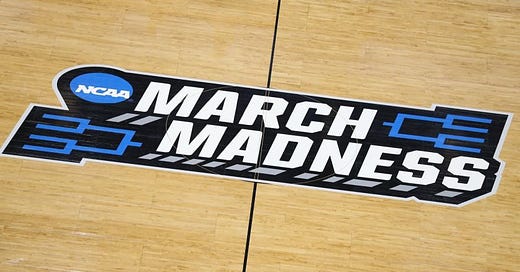Next week will see the return of the NCAA tournament, the best postseason in sports, after its cancellation in 2020. College basketball may have faded in its relevance, but it still has March Madness to draw people back. Every year fans who complain about the low quality of play, about the prevalence of freshmen, about the decline of the college big man, or whatever other issue in the sport… they all come crawling back to fill out their brackets and watch a ton of games crammed into a few weekends.
But what makes the NCAA tournament successful? It is, by design, a crapshoot. Unlike other playoff systems, it does not purport to select the best team in the sport. Virtually everyone acknowledges that if you ran the same tournament with the same teams 10 different times, you would get 10 different results. Nor does it even include the best teams—by giving every conference an automatic bid, no matter the strength of the conference, the tournament always includes a mix of both power conferences and mid-majors. You don’t even have to be the best team in a bad conference to earn that automatic bid—any team that gets hot and wins a conference tournament can do it.
This is not really fair, at least based on a theory of desert. Why should some teams have a much easier path to the tournament than others? The NCAA tournament doesn’t even have byes or home-court advantage to reward teams that have strong regular seasons. March Madness puts all the teams (excepting the stupid First Four games) into the more or less the same position at the start of the tournament, regardless of what they’ve “earned” based on their season.
Perhaps this is a vindication of a different, more egalitarian kind of fairness. Maybe the tournament is fair precisely because of its level playing field. Except it also fails by this metric.
The NCAA tournament actually has surprisingly FEW winners from outside its traditional elite programs. The last 11 champions include Duke twice, North Carolina twice, Villanova twice, and Connecticut twice. Two of the other three winners went into the tournament as the #1 overall seed. So the tournament is NOT particularly egalitarian, or even all that inclusive: The 68 tournament teams represent only ~20% of Division I basketball teams, compared to 25-50% of pro teams that typically make their league’s playoff.
So what the hell? The tournament seems like an incoherent mess that corresponds to no obvious theory of fairness, and yet people still like it. What should this tell political philosophers who spend years arguing about merit-based theories of justice versus equity-based theories of justice?
Well, here are some hypotheses:
1) People are fine with a little randomness, as long as it affects everyone equally.
This is really the key point. What makes March Madness mad is its unpredictability. The #1 overall seed is certainly more likely to win, but that doesn’t mean they cannot be beaten, even by a lowly 16-seed. And one loss is all it takes. This is a key difference from the College Football Playoff, where some teams can afford one bad game and some teams cannot.
2) Good systems allow for different versions of success.
Does anyone think that the 2018 UMBC team that beat Virginia felt like a failure because they lost their next game? Or that 2013 15-seed Florida Gulf Coast team that made the Sweet 16 was crushed to miss out on the Elite Eight? Of course not. The tournament is not great just for the Final Four, but for all the success stories that precede it. Arguably the best week of March is this week, before Selection Sunday, with all the conference tournaments to see who even gets into next week’s big dance. This way even teams that get eliminated in the first round have journeys that casual fans can get excited about.
3) Fun is better than fairness.
The real reason that March Madness is popular, of course, is that it’s a lot of very high-stakes games all at once. This is fun. People will tolerate a lot of stupidity in design if the end result is very enjoyable. Obviously we should try to rectify inequities in the design of a sport or a tournament, but the main priority is that it be fun.
Maybe these points are obvious, but I think they carry important lessons about how to think about justice and fairness. So keep that in mind as you watch the games—lol, just kidding, obviously don’t think about that when you watch basketball.



